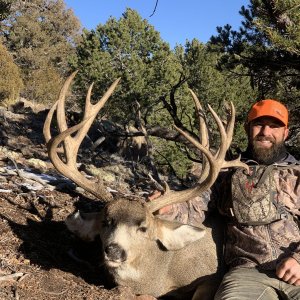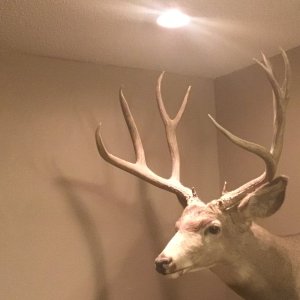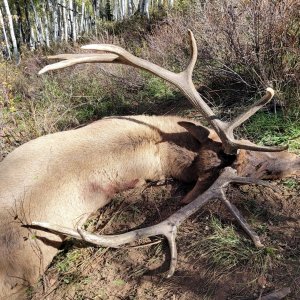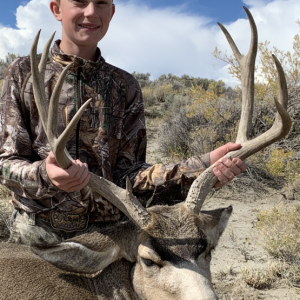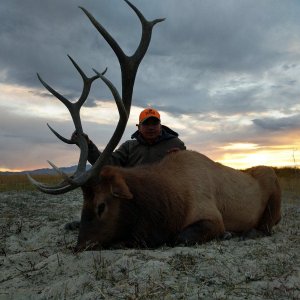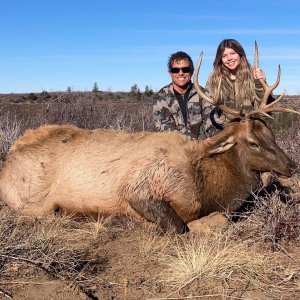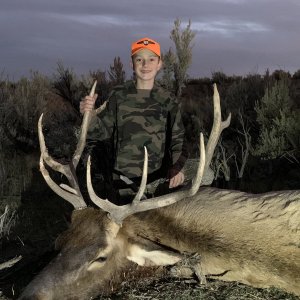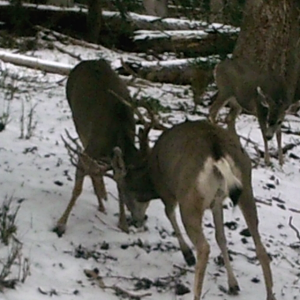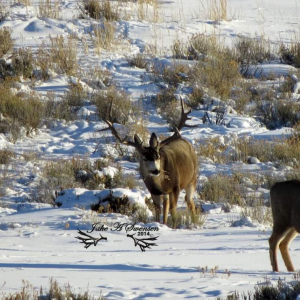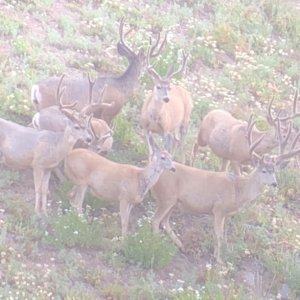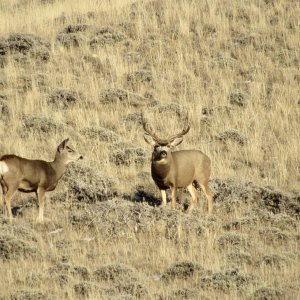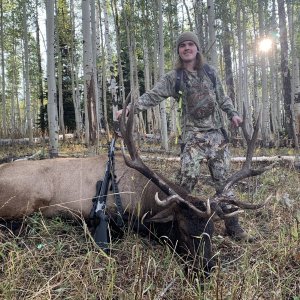M
misner5
Guest
Experts predict impact of wolves on elk, deer
MCCALL ? Wolf experts told the Idaho Fish and Game Commission on Wednesday to expect major changes in Idaho?s elk and deer populations and hunting opportunities after wolves become established in the state.
Commissioners heard from four wildlife experts during their regular commission meeting.
Predictions from the scientists, three of whom have studied wolves, ranged from serious long-term declines in elk populations to short-term declines followed by a rebound as predator and prey populations reach equilibrium.
However, none claimed to have the definitive answer as to what will happen in Idaho.
?There?s a lot of murky water. We do have to take it all with a grain of salt,? F&G wildlife manager Jim Hayden from Coeur d?Alene said.
Hayden presented the commissioners with a computer model based on existing information about how wolves affect elk.
The likely scenario would be maintaining elk herds by managing hunters and predators other than wolves, which are protected under the Endangered Species Act.
?We have to compensate by managing those other species,? he said ?Adjusting populations of lions, bears and elk hunters will allow us to compensate for wolf impacts in some units.?
However, he also pointed out that predator reduction in some backcountry units is not feasible, and hunters would be the only variable that could realistically be managed in some areas.
Wolves were reintroduced into Idaho in 1995-96 and there are currently about 260 of them in the state.
Scientific research done by Kyran Kunkel of the Turner Endangered Species Fund probably most closely resembles Idaho?s situation.
In the early 1980s, wolves naturally recolonized in Northwest Montana near Glacier National Park, and scientists started studying them during that time.
Kunkel?s studies showed that wolves favored white-tailed deer over elk and moose, but would shift to those animals when they were available.
Kunkel?s work also showed that wolves and cougars co-existed in the study area, as well as did black and grizzly bears, and all preyed on deer, elk and moose.
After recolonization by wolves, deer and elk numbers declined and so did hunter success. At the same time, populations of deer, elk and hunter success improved elsewhere in Montana where there were no wolves.
His studies showed that as prey species declined, cougars eventually starved, wolves killed each other and had lower reproductive rates, and the prey animals consequently rebounded and hunter success improved.
Kunkel said that cycle would likely repeat itself in the long term, and there was probably little that could be done to change it. ?We shouldn't kid ourselves and think we can manage predator and prey for stable populations,? Kunkel said.
Dennis Murray of the University of Idaho explained that predators, including hunters, tend to target different ages of prey. Bears will prey on young, wolves prey on young and old, and cougars and hunters prefer mature animals.
Murray?s finding came from a three-year study of wolf and cougar kills during winter in eastern Idaho near Salmon. During that period, about three-quarters of wolf and cougar kills were elk, and about one quarter were deer.
The cumulative effect was elk herds declined in the area, but it was also noted they were declining before the wolves were reintroduced.
Murray said the Salmon-area study was a ?very small snapshot in time and space.? He encouraged commissioners to aggressively monitor elk population to try and determine what is happening to the elk in that area, which he said is more effective than trying to study wolves.
One scientist, Tom Bergerud from British Columbia, Canada, had more dire predictions about wolves.
?I predict that you're going to have major impacts from wolves in this state,? he said. ?I predict a major elk decline.?
He said he saw wolves repeatedly depress moose, caribou and elk populations while studying them throughout Canada, and in some cases they wiped out local populations of caribou.
?I've watches herd after herd (of caribou) go extinct across Canada,? he said
.
Bergerud said wolves will concentrate on one prey species until it is depressed, then move onto another when it was available.
He also said reducing wolf numbers led to increases in prey animals, but wolf reductions had to be done over a wide area and for long periods of time.
?As far as I'm concerned, wolves do not self regulate,? Bergerud said. ?I know it's pie in the sky, but you have to have management.?
MCCALL ? Wolf experts told the Idaho Fish and Game Commission on Wednesday to expect major changes in Idaho?s elk and deer populations and hunting opportunities after wolves become established in the state.
Commissioners heard from four wildlife experts during their regular commission meeting.
Predictions from the scientists, three of whom have studied wolves, ranged from serious long-term declines in elk populations to short-term declines followed by a rebound as predator and prey populations reach equilibrium.
However, none claimed to have the definitive answer as to what will happen in Idaho.
?There?s a lot of murky water. We do have to take it all with a grain of salt,? F&G wildlife manager Jim Hayden from Coeur d?Alene said.
Hayden presented the commissioners with a computer model based on existing information about how wolves affect elk.
The likely scenario would be maintaining elk herds by managing hunters and predators other than wolves, which are protected under the Endangered Species Act.
?We have to compensate by managing those other species,? he said ?Adjusting populations of lions, bears and elk hunters will allow us to compensate for wolf impacts in some units.?
However, he also pointed out that predator reduction in some backcountry units is not feasible, and hunters would be the only variable that could realistically be managed in some areas.
Wolves were reintroduced into Idaho in 1995-96 and there are currently about 260 of them in the state.
Scientific research done by Kyran Kunkel of the Turner Endangered Species Fund probably most closely resembles Idaho?s situation.
In the early 1980s, wolves naturally recolonized in Northwest Montana near Glacier National Park, and scientists started studying them during that time.
Kunkel?s studies showed that wolves favored white-tailed deer over elk and moose, but would shift to those animals when they were available.
Kunkel?s work also showed that wolves and cougars co-existed in the study area, as well as did black and grizzly bears, and all preyed on deer, elk and moose.
After recolonization by wolves, deer and elk numbers declined and so did hunter success. At the same time, populations of deer, elk and hunter success improved elsewhere in Montana where there were no wolves.
His studies showed that as prey species declined, cougars eventually starved, wolves killed each other and had lower reproductive rates, and the prey animals consequently rebounded and hunter success improved.
Kunkel said that cycle would likely repeat itself in the long term, and there was probably little that could be done to change it. ?We shouldn't kid ourselves and think we can manage predator and prey for stable populations,? Kunkel said.
Dennis Murray of the University of Idaho explained that predators, including hunters, tend to target different ages of prey. Bears will prey on young, wolves prey on young and old, and cougars and hunters prefer mature animals.
Murray?s finding came from a three-year study of wolf and cougar kills during winter in eastern Idaho near Salmon. During that period, about three-quarters of wolf and cougar kills were elk, and about one quarter were deer.
The cumulative effect was elk herds declined in the area, but it was also noted they were declining before the wolves were reintroduced.
Murray said the Salmon-area study was a ?very small snapshot in time and space.? He encouraged commissioners to aggressively monitor elk population to try and determine what is happening to the elk in that area, which he said is more effective than trying to study wolves.
One scientist, Tom Bergerud from British Columbia, Canada, had more dire predictions about wolves.
?I predict that you're going to have major impacts from wolves in this state,? he said. ?I predict a major elk decline.?
He said he saw wolves repeatedly depress moose, caribou and elk populations while studying them throughout Canada, and in some cases they wiped out local populations of caribou.
?I've watches herd after herd (of caribou) go extinct across Canada,? he said
.
Bergerud said wolves will concentrate on one prey species until it is depressed, then move onto another when it was available.
He also said reducing wolf numbers led to increases in prey animals, but wolf reductions had to be done over a wide area and for long periods of time.
?As far as I'm concerned, wolves do not self regulate,? Bergerud said. ?I know it's pie in the sky, but you have to have management.?

